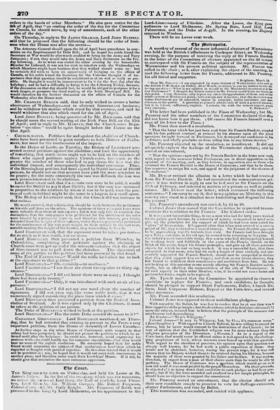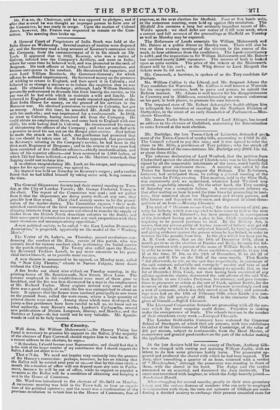Cbt AletropaIbt.
A meeting of several of the more influential electors of Westminster was held at the British Coffeehouse in Coekspur Street, on Wednesday evening, for the purpose of receiving the reply of Sir Francis Burdett to the letter of the Committee of electors appointed on the 3d instant to correspond with Sir Francis on the subject of the representation of Westminster and his present political opinions. Mr. Fearon was called to the chair ; at d, after explai ll i l ig the object of the meeting, be
read the following letter from Sir Francis, addressed to Mr. Pouncey, his old frielid and supporter. " hluigliton, Mara It.
" Dear Mr. Pompey am requested he some electors of West lll • ter, oho met at the British Core" leave On Plidak, 311 or :davit, to return to you tint answer to the 1St. ho' lint quistion—• What is my opinion in reeani to the Ministerial measates now tie. fore Parliament ?' I thought my former answer to Mr. neveur could leave no doubt cm this i • t. I can, there(re, may rerwitt may ent.re disapprobation of them, and of the %slit& svstem of Ministetial policy, both foreign and deniestie • that the measures two before Parliament are ill concocted, unjust in principle, rer:bly oust aluell, iota mis. Chli'VOUS 10 the public. A question so general admit e only of such a general answer; but it is. I trust, suflicieutly explicit. I temaiu, Sir, with the utmost respect, yours eery sincerely. F. ionteerr," This letter had been published in the Times of Wednesday ; but Mr. Pouncey rind the other members of the Committee declared that they did not know how it got there. (Of course Sir Francis himself sent it cop)' of his letter to the Times.) Mr. Prout then moved a resolution,
" That the letter which has just been read from Sir Francis Burdett. coupled with his late political 4 luct, as evinced by his absence upon all the great questions brought haward in Parliament, has destroyed our confidence in his est:hikes., and wholly precludes us from aiding Into iti any future election."
Mr. Pouncey objeeted to the resolution, as insufficient. It did not adequately express the feelitigs of the lVeatininster electors; and he moved all amendment, " That the opinions txpreaed by Sir Francis Heiden in the letter now read, teith regard to the measures before Parlianieut, are in direct opposition to the opinions of this meeting, and, as they believe, in oppositien also to those who teturned Sir Francis both:a to the House of Commune; and that he lie there- fore requested to resign his scat, and appeal to the juagmeat of the electors of Westt lllll ster."
Mr. Devear noticed the allusion to a letter which he had received from Sir Francis Burdett. Ile liad considered the comnamication pri- vate : it was mitten in reply to one lie had sect to Sir Francis on the 17 tit of February, and referred to matters of is titivate as well as public nature. Mr. Devear read the letter ; which comained the following
sentence—" I am sorry to say it, that bully opinion no Alinistty in this
country ever stood in a situation more hunnlititing and disgraceful than the present."
Poutieey's amembnent wire carried, by 44 to 10. Colonel Junes then moved that the Cuiranittee be requested to com-
municate the resolution to Sir Francis. The Colonel said— It wool most lamentable thing, to see a man who had for forty years wothed for the public good become, by a calainity of nature so impaired iu inittil as te give up the iirineiples for the support of which he had hero Once called the " glory 'of his COUNIFy. It happened often that when men arrived at a certain period of life. they lei-limed to a second infancy. Sir Francis Burdett appeared to he uppro ichuug rapidly towards that state. Sir Francis ball been brought up a Tory ; and now, in his old age, he seemed to be returning to Toryism. It was indeed a meet lameotable thing, that a man who hail distinguished himself by wialtiog tittly and feitlifully in the cause of the People, should, on the brink of the gime, forget his former inieciples, and give up all thew patriotic objects for o Ilich Ile had so lung winkol. It was a sorrowful fact, that those aestoillied in that room, who had for such a length of time cordially and suc- cesefully supported Sir Fiancis Burdett, Should HOW be compelled to declare that they tenth! support hint no longer ; and that, at any future election, they felt booml to withdraw their countenance and confitienre from him. Ile was 1110t 100king at this question as one merely affecting Sir Flames Burdett indivi- dually, but as affecting the representation of the city of Westminster: it ref teed equally to their other :Heather, who, if he could not come home caul pet iii, In his duties, ought to be replaced.
Mr. Tyrrell moved thut the Committee be appointed to choose & candidate to teplace Sir Francis ; and such candidate, be thought, should be pledged to support Short Parliaments, Ballot, Church Re- form, Irish Corporate Reform, Repeal of the Corn-laws, and several other measures.
Mr. Pruitt seconded this resolution.
Colonel Jones was opposed to these multifarious pledges— With regard to thin Ballot, lie was free to cedes% that he at one time was a firm supporter Mahe principle; but fresh erirknee which he hod since obtained(?) upon the subject, 'mowed Mtn to believe that the principle of the measure was mischievous and demoralizing. An Eatctor—ss les w weed ealies—o may 'lie Whiggery, hut, by G—, it's common sense." (Louellaneefer.) With legard to Church Reform, he was willing to amend its abuses, but he never would consent to the destruction of the Church ; for he was of opinion that the Established religion was far more tolerant than the religious principles of the Dissenters. ( Groans.) As to a repeal of the Corn•laws, that would never be effected unless it was agreed to by the clodhop- ping proprietors of land, whose interests were bound up with that question. With regard to the abolition of peuaions, his opinion upon that question was already well known, for he had made a public exposition of them: they would not be abolished, however, Eluting the piesent reign, for it was well known that his Majesty wished them to be retained during his lifetime, because the majority of them were granted by his father and brother. It was uselese therefore, to expect from a man of their choice more than he would be able to perform. The House of Commune was a isAychine which would go on as it now did until it traY made perfert by the peoplethenuelres. On these grounds, he ohjected (!) to tying down their candidate to such pledges as hail been pro. posed ; but if the list were amended aud confined to a few simple principles, he kl110111■1 hive no objection to support the amendment.
Pouneey moved an amerldnient, that the elector should ask their new candidate simply to promise to vote for Stiffrage-extenaion, shorter Parliements, and vote by Ballot. This resolution was seconded, and carried with applause. Mr. natant, the Chairman, said he was opposed to pledges ; and if after that avowal he was thought an improper person to form one of the Committee, he was ready to resign. Upon the motion of Colonel Jones, however, Mr. Fearon was requested to remain on the Com- mittee. The meeting then broke up.



























 Previous page
Previous page